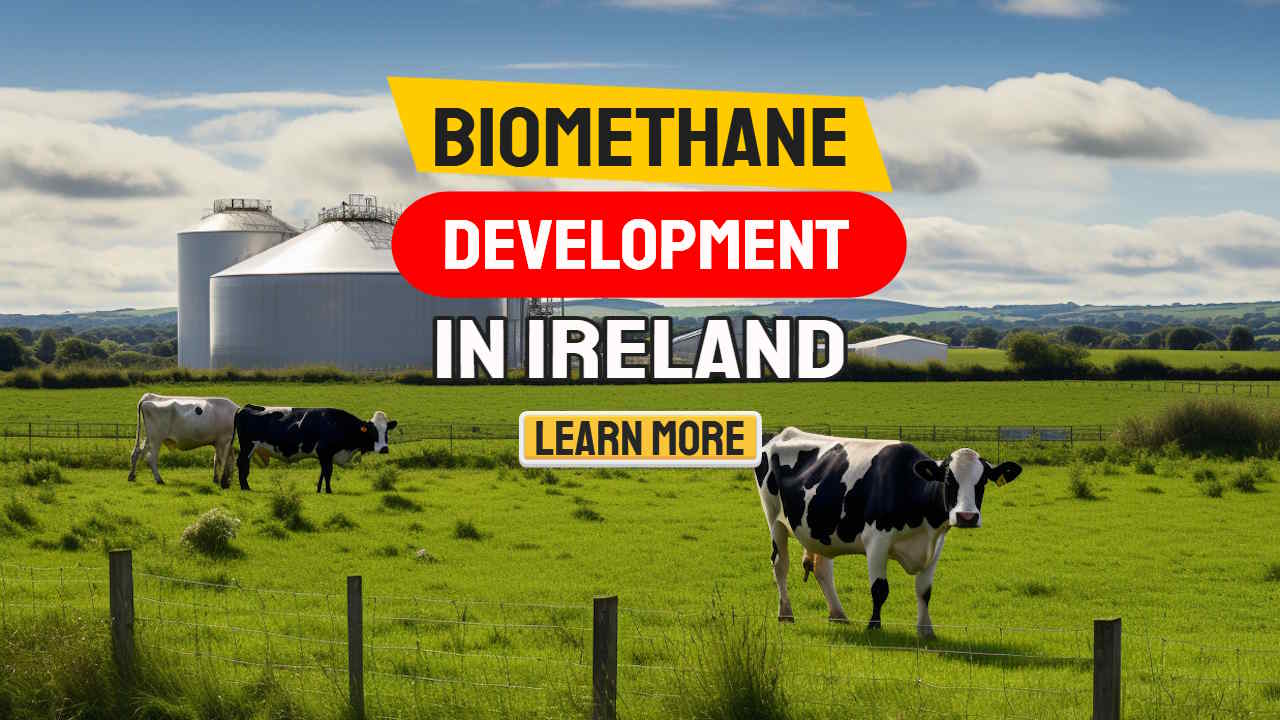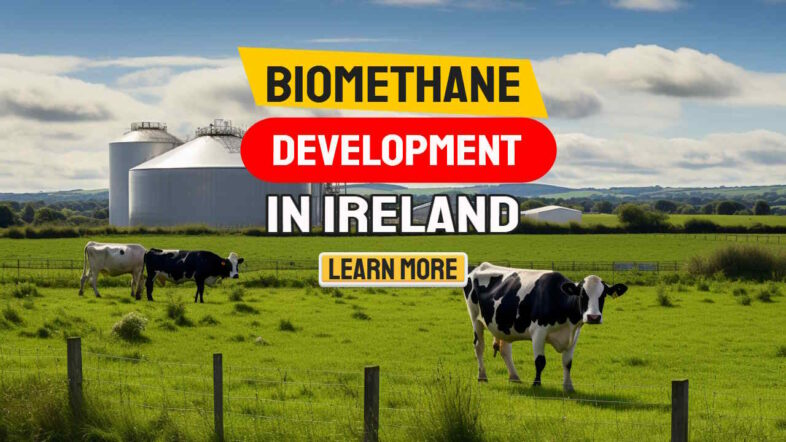In this article, we report on Biomethane Development in Ireland the story of the growth of Ireland's biomethane industry as reported in several business and media announcements, as of the autumn of 2023.
As an EU member nation Ireland's bioenergy sector, including the Anaerobic Digestion industry, will participate in the “REPowerEU Strategy“. The new EU-wide initiative known as the “REPowerEU Strategy” became law in the late spring of 2023.
REPowerEU Strategy has been hailed to become a game changer for the European Biogas Industry and a significant boost for biomethane generation from biogas, driving the building of many more anaerobic digestion facilities across the European continent.
It has yet to be implemented in the republic, but even before the REPowerEU Strategy is implemented the state is experiencing the start of new developments in biomethane production.
[boomdevs_toc]
Ireland Moves from an Anaerobic Digestion Sector Making Biogas to the Next Stage of Biomethane Production
Ireland stands at the threshold of a renewable energy renaissance, but it will not now, it seems, be primarily driven as it was previously in the state, as in most nations, by anaerobic digestion plants built to create and burn crude biogas largely untreated to generate electrical power and feed electrical energy into the local power grid.
For Biomethane Development in Ireland, biomethane not biogas, is poised to play the most substantial role in reshaping the nation's carbon footprint. Technology has moved on. Now it will be biomethane that is sold. This far purer gas is biogas but with its C02 content removed, and purified to the point that it has properties interchangeable with natural gas (RNG) and is called Bio-LNG within the traditional energy sector.
From now on, purified biogas which is almost 100% just methane, will be in heavy demand as a heavy transport fuel and command a price capable of bolstering agricultural incomes.
Since 2020, the Irish natural gas industry has, in a move a few years behind most other nations, geared up for, and started to accept injected biomethane to join the non-renewable gas supplied to consumers which is “natural gas”.

A Blossoming Biomethane Industry is Predicted
According to a recent report by Gas Networks Ireland, the blossoming biomethane industry harbours the potential to pare down the country's emissions by four million tonnes annually, which is equivalent to a significant 6.5% reduction in Ireland's total emissions.
Biomethane Development in Ireland, namely the production of RNG (Renewable Natural Gas) makes good sense in a rural nation lacking the electrical grid capacity found in more urban nations. To start with, electrical grid distribution on average only delivers about 70% of the energy delivered into the system as useable energy for the consumer.
By comparing gas grid distribution is a lower energy loss. Even with the transport of the biomethane by road in cylinders, the energy loss compared with the inadvertent heating of the wires strung between pylons and in transformers, is much lower.
The same move toward biomethane production and gas grid injection is common everywhere and not unique to Ireland. It is now the main driver for new biogas plant development in most countries.
Therefore, it seems very plausible that by compressing the biomethane, Irish farms remote from high-tension grid connections but well suited to grass production will now be able to diversify profitably into energy production alongside traditional dairy farming.
A New Horizon for Ireland’s Energy Landscape
As an exemplary carbon-neutral renewable gas, biomethane showcases structural identicality to natural gas, providing seamless compatibility with existing national gas networks, appliances, and technologies.
In case of any doubt, we note that Biomethane Development in Ireland is all about biomethane produced from farm and food waste through a process called anaerobic digestion, thereby offering the added bonus of a lucrative method to recycle agricultural waste into energy and a by-product of captured CO2.
That CO2 may not currently be of any value but promises to hold future value for those looking to offset unavoidable carbon emissions in their businesses. For them, the ability to carry out carbon capture of biogas-derived CO2 is likely to become very valuable for inclusion in a company's Net Zero Plans when carbon removal is needed to offset unavoidable emissions.
Revolutionizing Ireland’s Energy Dynamics
Biomethane Development in Ireland, by harnessing the potential of biomethane could revolutionize Ireland’s energy dynamics.
Gas Networks Ireland underscores the significant opportunity to replace over 25% of the natural gas currently coursing through the network with biomethane, thereby catalysing the emergence of substantial new streams of agricultural income.
Presently, the national gas network supervised by Gas Networks Ireland caters to more than 30% of Ireland's energy needs, including supplying 40% of all heating and nearly half of the electricity generated in the country.
The organization made strides by introducing domestically produced biomethane in 2020, and in the previous year, it successfully transported 41 gigawatt-hours of biomethane through the national network.
Fuelling a Sustainable Future
The Biomethane Energy Report details the result of a questionnaire which identified a possible 176 viable biomethane projects nationwide, boasting the collective capability to generate an impressive 14.8 terawatt-hours (TWh) of biomethane each year. This translates to fulfilling 26% of Ireland's current gas demand.
Gas Networks Ireland's view on Biomethane Development in Ireland is optimistic. Their view is that reaching the government's target of 5.7 TWh of biomethane production by 2030 is not only achievable but may even surpass expectations. As long as it is given the right supportive structures and policies.
However, there is a huge gap between these figures and the figure we found for existing AD plants showing that a massive amount of development will be needed. In fact, the highest estimate we found online for current Irish digesters was no more than 50, from the Vogelsang website. Teagasc the Irish government's Agriculture and Food Development Authority suggests even fewer to be operational at about 20 in 2020.
Ireland Reaches a Milestone in Commercial Transportation
A significant advancement in biomethane utilization is the introduction of ‘BioCNG' fuel for heavy goods vehicle (HGV) users, a collaborative endeavour spearheaded by Brian Connolly, Senior Fuels Manager at Circle K Ireland, and Barry Murphy, Commercial Director of Flogas Enterprise. This initiative heralds a shift in the transport industry, traditionally a sector difficult to decarbonise, towards more sustainable fuel options.
Available at selected Circle K fuel stations, BioCNG is derived from biomethane compressed into renewable fuel, a development that sets a benchmark in the commercial sector, with Circle K being the first public company to offer this green fuel alternative at their stations. This initiative, backed by the supply chain prowess of Flogas Enterprise, a sector leader in the biomethane distribution network, marks a substantial stride in reducing the carbon footprint of Ireland's commercial transport fleet.
Barry Murphy emphasized the timely introduction of the contract with Circle K, aligning with a global trend of commercial fleets transitioning to CNG and BioCNG. Despite electric solutions not yet being a feasible option for heavy goods vehicles, CNG and BioCNG present viable alternatives, now being adopted across European business sectors.
Since the inauguration of the BioCNG outlets at Circle K, an estimated 4,000 tonnes of carbon emissions have been averted, tantamount to over 40,000 carbon-neutral kilometres, remarked Brian Connolly. This venture, supported by Flogas Enterprise, champions a greener future, proving that the journey to carbon neutrality is not just viable, but already well underway in Ireland.
Conclusion – Biomethane Development in Ireland
As Autumn 2023 unfolds, Ireland finds itself at the helm of an energy transition.
Biomethane Development in Ireland is about to start with the “REPowerEU Strategy” incentives to be implemented soon the forthcoming biomethane development promises not only a greener future but also a sustainable and prosperous one for the farms and businesses involved.
It will reinforce Ireland's commitment to a cleaner, greener, and more sustainable tomorrow.





